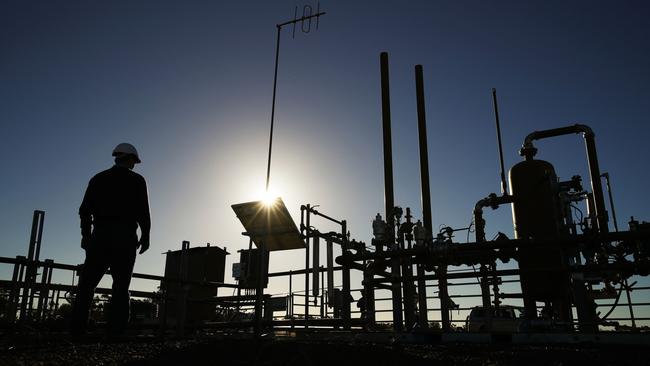CEO Survey 2024: Gas shortfall to keep coal for longer and make transition bumpy, executives warn
Australia is rapidly weaning from coal, but senior energy executives say the country must support gas or risk a bumpy and expensive transition.
Australia must prioritise shoring up gas supplies to prevent prolonged use of coal and a bumpy transition, the head of two of the country’s largest energy companies have warned.
Australia is moving at pace to reshape its $2.5tr economy, with the federal Labor government pledging to accelerate the build-out of renewable energy and recently announced plans to use taxpayer money to underwrite a substantial increase in zero emission energy sources.
But Adam Watson, chief executive of APA Group, the country’s largest listed gas infrastructure company, and Mark Collette, chief executive of EnergyAustralia, Australia’s fourth largest electricity and gas retailer, have warned Canberra is overlooking the vital role of gas in the country’s energy transition.
Both CEOs, participating in the The Australian’s 2024 CEO Survey, say more must be done to support gas through the energy transition.
“Australia can’t deliver a fast, fair and affordable transition by continuing to extend our reliance on coal-fired generation, while demonising the important role gas plays. Gas is required to back up renewables, power our key industries and support emerging industries, such as critical minerals. So we need to move quickly and prioritise unlocking new gas projects,” said Mr Watson.
The role of gas in Australia’s energy transition remains hotly contested. Victoria last year moved to curtail its use, banning the installation of gas in new builds from 2024, a move widely seen as an illustration of Australia’s second most populous state’s attitude towards the fuel source.

The move has won favour with environmentalists, who claim the use of gas will slow Australia’s energy transition to renewable energy sources.
But Mr Watson said opponents are overlooking the vital role of gas, joining a chorus of energy industry executives calling for Australia to embrace gas.
Prime Minister Anthony Albanese has said his government understands and supports the fuel source to hasten Australia’s energy transition, but developers have highlighted recent market intervention and struggles to secure government approvals for new projects as evidence of lukewarm backing.
The impact of tight domestic supplies is being felt in Australia already with domestic prices elevated, pushing some small manufacturers which cannot switch to renewables to the brink.
Mr Collette said the pain could grow as traditional supplies run dry, but new developments are struggling to win community and regulatory support.
“Longer-term, what worries us is gas supply. The Australian Energy Market Operator has been saying for years that there are big gaps in gas supply in the southern states from 2026 or 2027 with limits to alternatives like electrification. This is a scary outlook for homes and businesses, a problem that cannot be solved by industry alone,” said Mr Collette.
ExxonMobil — one of Australia’s largest producers of domestic gas — this year said its Gippsland Basin joint venture, which historically supplies more than 70 per cent of southeast Australia’s domestic gas demand, was rapidly dwindling.
Australia’s east coast will bear the brunt of the shortfalls, with demand expected to outstrip supply from 2025, leaving little time for new developments such as Santos’ Narrabri development to get online.
If new projects continue to struggle to secure regulatory permission and win local support, Australia’s east coast could be forced to turn to importing LNG from WA or the NT.
Developers such as billionaire Andrew Forrest have begun work to construct terminals to allow for the importation of LNG from WA or the NT, though industry sources say it remains uncompetitively priced.
Gas enjoys more political support in WA and the NT, though Santos and Woodside — both working on new major projects — say new developments are at risk from a spate of legal challenges.
The chief executives of Woodside and Santos both last week warned Australia must prioritise energy security by closing legal avenues for opponents to slow or even block new gas developments.
Santos chief executive Kevin Gallagher said Australia was in the midst of an “anti-fossil fuel war”, which Canberra must win or face a bumpy and expensive transition away from coal.
“Renewables are a big part of the solution, but we are still a long way from technologies that would replace fossil fuels in making steel, cement, fertilisers and the petrochemicals that make medicines, medical products, paint, plastics and the polymers that are the foundation for so many products we take for granted in modern life.”
Santos is moving to develop new sources of LNG, while also developing a carbon capture and storage project set to come online later this year.
Carbon capture and storage is controversial, with critics insisting it is unreliable and will delay the transition to renewable energy, while proponents argue the technology will minimise the disruption on the economy allowing for existing infrastructure to be used as well as sufficient time to build replacement renewable energy sources.
Mr Gallagher said Australia must embrace carbon capture and storage.






To join the conversation, please log in. Don't have an account? Register
Join the conversation, you are commenting as Logout